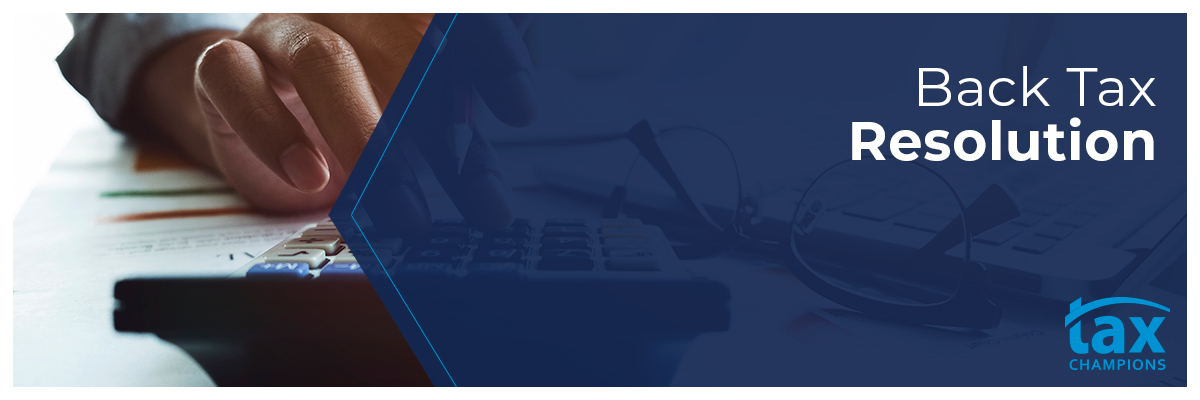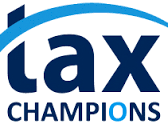Back Tax Resolution

Although most people strive to pay their taxes on time every year, many people have obstacles that lead to back tax resolution in the future. Back tax resolution is the settlement of past-due tax debt with the IRS. In other words, you can resolve your balance with the IRS by establishing a payment agreement. Read on to learn more about how it works.
The First Step in Back Tax Resolution: Filing Returns
The IRS is commonly relentless in penalties and interest for unfiled tax returns.
Although they often make exceptions in extraordinary circumstances, they are diligent in following the law of the tax code. This is especially true for filings and payments.
In fact, they assess penalties on delinquent taxpayers immediately after the deadline. They don’t allow for a grace period and they don’t send late notices before assessing these penalties.
What’s more, penalties are often steep and compounding interest adds up quickly. This makes paying the debt even more difficult. To demonstrate, we’ll discuss each of these penalties, and how the IRS applies them to your balance.
Failure to File Penalty
The IRS explains the failure to file penalty saying, “The penalty for filing late is normally five percent of the unpaid taxes for each month or part of a month that a tax return is late.” Taxpayers can minimize the penalty by paying as much of the tax balance as possible when they file.
However, you can save more money by filing on time with no payment than waiting to file until you can pay. This is because the failure to file penalty is generally more expensive than the failure to pay penalty. Read more on the failure to pay penalty in the next section.
Failing to file your tax return may result in two different outcomes. The IRS assesses a monetary penalty, as explained above, or jail time. The IRS chiefly uses jail time in cases of evasion. According to the IRS, “There’s no penalty for failure to file if you’re due a refund. However, you risk losing a refund altogether if you file a return or otherwise claim a refund after the statute of limitations has expired.”
Additionally, if the taxpayer requests a filing extension and has paid at least 90 percent of their tax liability at the time of the request, the IRS will forego the penalty. However, the taxpayer must pay the full balance by the extended deadline.
Although the failure to file penalty compounds the later you file your return, the IRS caps it at 25 percent. In other words, the IRS says, this penalty won’t exceed 25 percent of your unpaid taxes. But we understand this doesn’t provide much comfort to the struggling taxpayer.
Accordingly, the taxpayer's first step toward back tax resolution is to file missing tax returns as soon as possible.
Failure to Pay Penalty
While you won’t go to jail for not paying your taxes, the additional penalties don’t make a delinquent taxpayer’s situation any better. The IRS explains the failure to pay penalty:
- 5% of tax not paid by due date, April 15; 0.25% during approved installment agreement (if return was filed on time, and taxpayer is an individual); 1% if tax is not paid within 10 days of a notice of intent to levy
- Recurring charge on the remaining unpaid tax each month or part of a month following the due date, until the tax is fully paid or until 25% is reached
- Full monthly charge applies, even if the tax is paid before the month ends.
If the taxpayer is due a refund after a return is filed, then the IRS won’t assess a failure to pay penalty.
Back Tax Resolution: Preparation for Filing Returns
While the IRS is stringent on the deadline to file tax returns and pay taxes, they may be accommodating in justifying circumstances. For example, justifying circumstances may include a death in the taxpayer’s immediate family or an extended stay in the hospital.
By comparison, having no access to W-2 forms or other income documentation is rarely considered a justification for not filing a return. This is because the IRS can provide a record of your income to use for tax return preparation. This is called a Wage and Income Transcript.
This basic collection of income information is enough to start the process. We’ll happily guide you in the gathering of other necessary documents.
When the IRS Initiates Back Tax Resolution
The IRS is enthusiastic in helping taxpayers pay their taxes. So, they often submit a Substitute for Return on your behalf. Isn’t that nice? Maybe, but consider this. Since back tax resolution can’t begin until all returns are filed, someone must generate a return to get the ball rolling.
The IRS uses the Wage and Income Transcript to create a return. Markedly, they don’t go to the trouble of applying credits and deductibles you may qualify for. That is to say, you won’t benefit from your filing status, the number of dependents you have, or any write-offs you’re due. Consequently, the resulting tax liability is much higher than your fair share.
In addition, penalties and interest accrue at a faster rate. This is because they’re assessed using the inflated tax amount due, which further increases the balance.
The Fresh Start Initiative offers a way out.
Help with Back Tax Resolution
Whether to hire professional services for help or not is a personal choice. For example, a mechanic may choose to fix her own car, or an attorney may choose to represent himself in court.
Comparatively, the same mechanic is likely to hire professional representation if she has business in court. While the attorney will probably hire a professional to fix his car.
Likewise, a taxpayer may feel confident in doing her own simple tax returns. But she may not be comfortable with complex IRS forms and procedures.
The IRS website offers support for taxpayers who tackle the task on their own. Links to forms and complete instructions are available here. You may qualify for more than one tax relief program after you've filed all of your returns.
Take caution in choosing the program you pursue. Some may have more favorable results than others. Choosing the right program is essential in a successful back tax resolution.
Back Tax Resolution with the Fresh Start Initiative
The Fresh Start Initiative is a collection of tax debt relief programs designed to help taxpayers. It includes the following programs.
- Installment Agreement
The IRS established 798,403 installment agreements in 2017. A taxpayer with an installment agreement can pay off their debt in equal, monthly payments. Taxpayers use this part of the Fresh Start Initiative most.
- Offer in Compromise
The offer in compromise, on the other hand, is the least used program. It allows the taxpayer to settle their debt for less than they owe. Although it’s highly sought after, it’s the most difficult to qualify for.
- Penalty Abatement
Many taxpayers qualify for a penalty abatement. This program removes or reduces some of the penalties incurred, especially if the penalty is your first.
- Partial Pay Installment Agreement
These unique installment agreements combine the benefits of an installment agreement and an offer in compromise. Essentially, taxpayers make payments on their debt for a set period of time.
Regardless of the remaining balance at the end of the term, the taxpayer’s case is settled. The IRS doesn't require payment on the back-tax debt.
Why Tax Champions for Back Tax Resolution?
Experts recommend hiring professional tax help when you need to resolve back tax debt with the IRS. With over 35 years of experience and an A+ rating at the Better Business Bureau, Tax Champions is a highly qualified, reputable choice for trusted tax relief services.
Give us a call at 800.518.8964 for your free consultation. We’re available for our clients every day of the week during standard business hours, as well as in the evening.
Call us today and you’ll certainly sleep better tonight.
Sources
[1] Eight Facts on Late Filing and Late Payment Penalties. (2019, July 17). Retrieved from //www.irs.gov/newsroom/eight-facts-on-late-filing-and-late-payment-penalties
[2] Filing Past Due Tax Returns. (2019, February 22). Retrieved from //www.irs.gov/businesses/small-businesses-self-employed/filing-past-due-tax-returns
[3] Forms & Instructions: Internal Revenue Service. (2019, May 1). Retrieved from //www.irs.gov/forms-instructions
[4] Tax Champions: Better Business Bureau® Profile. (n.d.). Retrieved August 20, 2019, from //www.bbb.org/us/ca/ventura/profile/tax-consultant/taxchampions-1236-92012281
[5] Topic No. 153 What to Do if You Haven't Filed Your Tax Return. (2019, August 1). Retrieved from //www.irs.gov/taxtopics/tc153
[6] Transcript Types and Ways to Order Them. (2019, March 4). Retrieved from //www.irs.gov/individuals/tax-return-transcript-types-and-ways-to-order-them
[7] Understanding Penalties and Interest: Internal Revenue Service. (2019, May 30). Retrieved from //www.irs.gov/businesses/small-businesses-self-employed/understanding-penalties-and-interest
[8] Back Payroll Tax Resolution //taxreliefprofessional.com/back-payroll-tax-resolution
